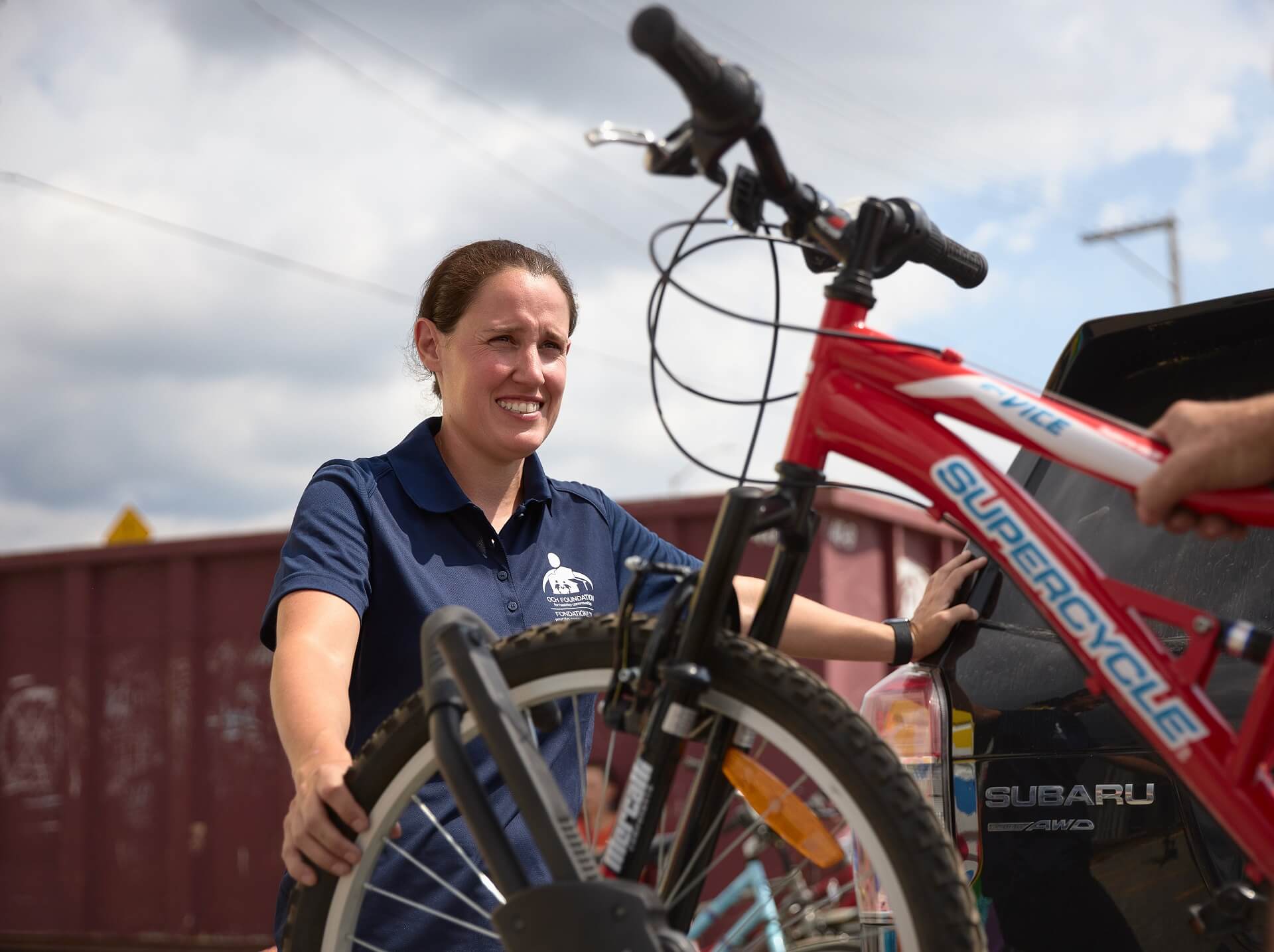Having spent most of his time dodging through traffic in and around town
and even biking through Rhône Valley during a vacation in France, Gibson
has switched gears to focus on getting bike enthusiasts and beginners “back
on the bike saddle.” He currently volunteers his time at Re-cycles Ottawa – a non-profit that
provides low-cost access to a fully-equipped bike repair shop, affordable,
recycled bikes to the community, and even teaches curious DIYers on how to
repair their own bike.
“I really enjoyed cycling anytime I’ve been on a bike,” Gibson says. “After
a long and busy career in IT, I looked for something to keep me busy during
retirement. I always enjoyed dabbling in bikes and suddenly found myself
drawn into the vortex of learning how to fix bikes and helping others keep
their own bikes on the road.”
Some of the most common bike repairs Gibson sees regularly are flat tires,
worn out brake pads and general neglect and tune ups.
“Every bike has its own diagnosis and mechanical puzzle challenge, and
they’re fun to work through,” Gibson says. “And then there's a personal
satisfaction where I can repair or build a bike to make someone’s life
better, especially when the bike is for a child. It pulls on my
heartstrings every time.”
The team at Re-cycles Ottawa has refurbished over 100 bikes for children
and youth living in Ottawa Community Housing (OCH) as
part of the OCH’s “Hop on Bikes” program. Hop on Bikes evolved from an idea
to help kids during the pandemic. As an Energizing Life Recipient, OCH will
match more bikes with kids in the communities they serve throughout the
year.
Watch the video now
We’re accepting applications to our 2023 Energizing Life Community Fund
Apply Now
DIY on the rise
Gibson reassures that anyone with “a little patience” can change a flat
tire, replace a new bike chain, adjust the shifting or even install a new
cable.
“The only barrier to performing any repairs or maintenance is access to the
special tools … which we have at our DIY shop,” he says. “Bikes are very
tolerant. Just by putting a little lubricant on the bike’s chain from time
to time and keeping the chain free from dirt and debris build up, and
keeping an eye on how well the brakes are working, will keep the bike happy
for a good year or so and contribute to the bike’s overall longevity,” he
adds.
Since the pandemic, Re-cycles Ottawa has witnessed an increase of people,
of all ages, who want to learn more about fixing bikes. DIYers can visit
Re-cycles Ottawa to access tools and shop space, consult with staff for
advice and guidance, and purchase “previously enjoyed” replacement parts to
use on their own bike. As a bonus, Re-cycle Ottawa volunteers receive a
free hour of work on their own bike in exchange for every hour of
volunteering.
“We have a number of people who show up once a week, and those are usually
the people with more service, people we call head mechanics who have really
deep skills with the bikes, but also really good knowledge of our processes
and the ability to coach other people in the ways of bikes and how we do
stuff.”
If you’re not in the Ottawa-area, there are several communities across the
province that have Co-op bicycle shops that offer similar services.
Maintenance and safety tips are always in season
Whether your bike has been sitting neglected for a few years, or you’re an
avid rider, bike maintenance is important to ensure your bike functions
smoothly and prevents wear and tear on the bike’s components.
The fall and winter seasons require extra safety and maintenance
precautions because of the changing weather and lighting conditions.

10 tips to keep you safe all year round:
-
The start of the season and year-end maintenance is critical if you want a winter
bike that’s going to last more one winter. Start with a pre-fall / winter
tune up. Visit Re-cycles Ottawa or a similar local shop.
-
Be diligent with lubrication maintenance – remember that gears, chains,
pedals and the seat post / stem are all exposed to seasonal elements and
need regular care / lubrication.
-
Consider purchasing studded tires (for winter riding)
-
If you’re inexperienced with fall / winter riding, start now. You don’t
want your first ride to be after a big snowfall.
-
Always wear a helmet, high-visibility gear and use lots of lights
(headlights and taillights).
-
Pay attention to the brakes and cables.
-
If you’re purchasing a new bike, always get it fitted correctly.
-
Adjust the bike saddle position. A saddle that’s too high or too low
diminishes the ability to generate force which can lead to anterior knee
pain.
-
Budget between $20-$150 for bike repair / maintenance every year.
-
Bikes don’t need to be fancy. A well-treated bike will serve its user
for a very long time.
Lastly, if you’re in the market for a new bike or have given up riding,
consider donating your bike to Re-cycles Ottawa or a similar shop in your
community.
“Your bike can be an organ donor,” Gibson says. “Your bike will have parts
that somebody else can use. “We’ll be happy to take your bike, fix it up,
give it a new life and pass it on to somebody else for their own
enjoyment.”